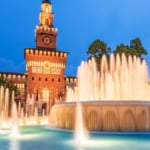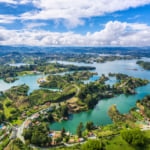Name: JR Hakata City
Address: 1-1 Hakata Station Chuo-gai, Hakata-ku, Fukuoka City, Fukuoka Prefecture
Official/Related Website URL: http://www.jrhakatacity.com/index.php
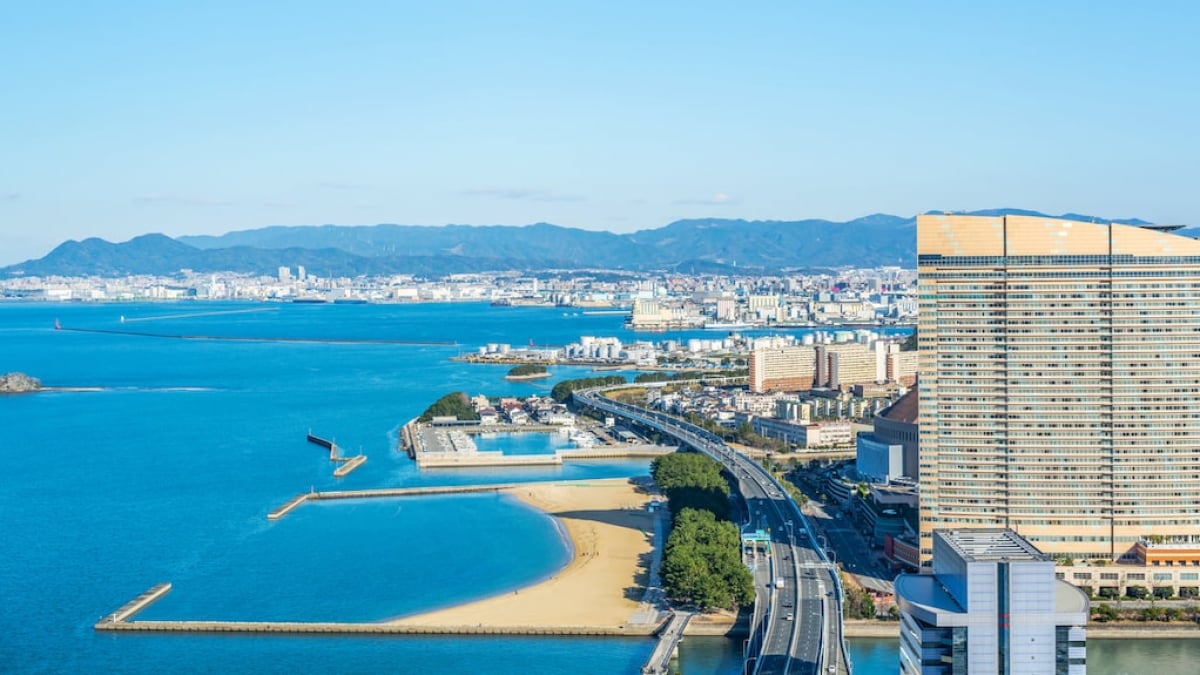
17 Recommended Sightseeing Spots in Hakata! | Not Just About Food, There’s So Much More!
We introduce 17 recommended sightseeing spots in Hakata!
Hakata, located in Fukuoka, is well-known for its gourmet food like Hakata ramen and motsunabe (offal hot pot). The area has excellent accessibility, with the Shinkansen stopping at Hakata Station and just a 6-minute ride from Fukuoka Airport. It's a popular tourist destination that's easy to visit even from other regions.
However, Hakata is not just about food. There are many hidden gems, including sightseeing spots for young people, places accessible without a car, and spots where adults can also have fun. Check out this article to discover what tourist attractions Hakata has to offer.
table of contents
[x] close
17 Recommended Sightseeing Spots in Hakata! | Not Just About Food, There’s So Much More!
- 1. New Buildings Around Hakata Station
- 2. Canal City Hakata
- 3. Tōchō-ji Temple
- 4. Kushida Shrine
- 5. Hakata Riverain
- 6. Suijo Park “SHIP’S GARDEN”
- 7. River Cruise (Hakata, Nakasu, Naka River Water Bus)
- 8. ACROS Fukuoka & Tenjin Central Park
- 9. Bayside Place Hakata
- 10. Ōhori Park
- 11. Fukuoka Castle Ruins
- 12. Fukuoka City Seaside Park “Umippi Beach”
- 13. Fukuoka City Museum
- 14. Street of World Architects
- 15. Fukuoka Open Top Bus (FUKUOKA OPEN TOP BUS)
- 16. Hakata Food and Culture Museum (HAKUHAKU)
- 17. Nokonoshima Island Park
- ◎Summary
1. New Buildings Around Hakata Station
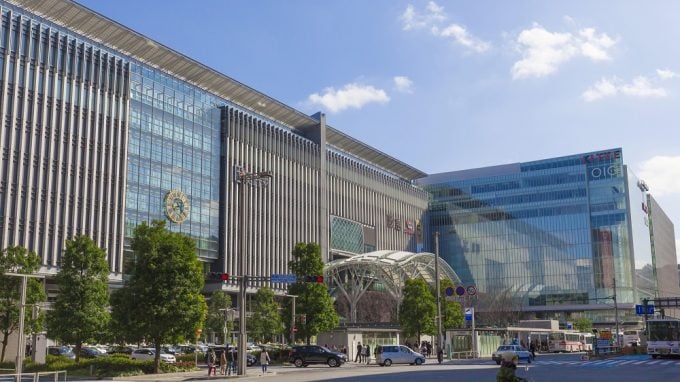
Around Hakata Station, you’ll find complex commercial buildings such as JR Hakata City, KITTE Hakata, and JRJP Hakata Building, making the station a hub that combines elements of gourmet, shopping, and sightseeing spots.
The large building on the left side of the image is JR Hakata City, the building on the right side is KITTE Hakata, and the one behind it is JRJP Hakata Building. You can move between JR Hakata City, KITTE Hakata, and JRJP Hakata Building through the pedestrian deck on the second floor or the underground passage on the first basement floor, making it easy to move around even on rainy days without needing an umbrella.
◆JR Hakata City
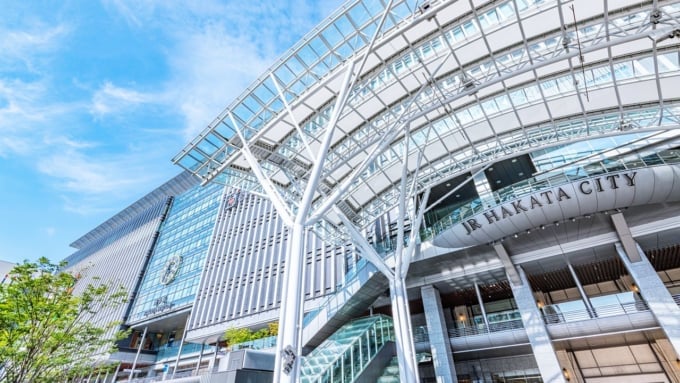
The station building of JR Hakata Station, JR Hakata City, is a complex commercial building consisting of Hakata Station, Amu Plaza Hakata, and Hankyu Department Store. It has 10 floors above ground and 3 floors underground. The left side of the image shows Amu Plaza Hakata, while the right side is Hankyu Department Store, with a central concourse open up to the third floor.
Amu Plaza Hakata is centered around Tokyu Hands and includes Amu Plaza Hakata’s specialty store area, Hakata Deitos, the restaurant floor “City Dining Kuuten” on the 9th and 10th floors, and the restaurant area “Hakata 1st Avenue” on the first basement floor. Even though it’s close to the station, you can easily spend a lot of time here. It’s truly one of the iconic station buildings in Kyushu!
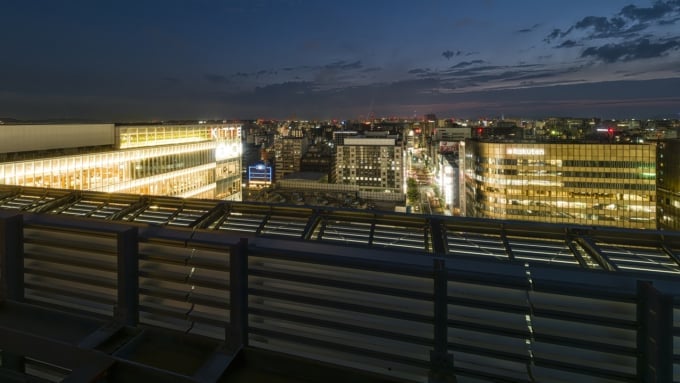
The rooftop Tsubame no Mori Hiroba is a popular sightseeing observation spot for tourists arriving at Hakata Station. It’s free to access from 10 AM to 11 PM. Events such as the “Kodomo City” (Children’s City) are bustling with families. From the observation terrace, you can overlook Fukuoka City’s urban area to Hakata Bay, making it a recommended romantic spot for night views.
The Train View Spot on the 9th floor is a hidden sightseeing and resting place where you can watch trains arriving and departing from Hakata Station from above. It’s located to the left behind the movie theater, and even without a ticket, it’s free to access. The bench, designed like a station waiting room, and the calm interior are also well-received by train enthusiasts and tourists.
◆KITTE Hakata
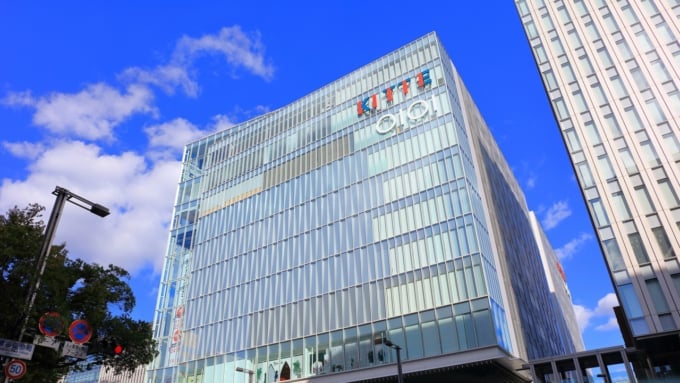
KITTE Hakata is a complex commercial building with Hakata Marui from the 1st to 7th floors as its main feature. This is the second “KITTE” building after the one in Tokyo and is managed and operated by Japan Post Co., Ltd. The name is a play on the words “kitte” (postage stamp) and “kite” (come). The 8th floor houses Uniqlo and clinics, while the top floor is home to the wedding hall hakatagi.
Based on the concept of “Let’s take a good rest,” KITTE Hakata offers cafes on every floor where you can relax. The 9th, 10th, and basement 1st floors feature a restaurant area called “Umaito,” with over 20 restaurants making their debut in Kyushu. The restrooms on the upper floors are designed like sightseeing observation spaces, clean, and stylish.
Name: KITTE Hakata
Address: 9-1 Hakata Station Chuo-gai, Hakata-ku, Fukuoka City, Fukuoka Prefecture
Official/Related Website URL: http://kitte-hakata.jp/
◆JRJP Hakata Building
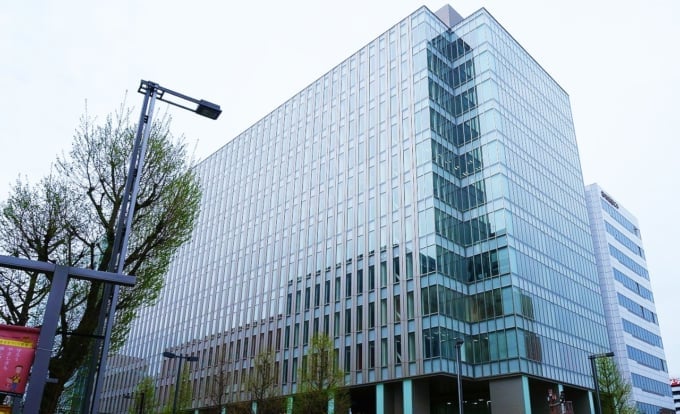
JRJP Hakata Building is an office building opened in April 2016, jointly operated by JR Kyushu and Japan Post. It features popular restaurants. On the first floor, you’ll find Hakata Post Office, Japan Post Bank, Lawson, and Starbucks. The second floor houses Hard Rock Cafe, “Ore no French,” and the business convenience store Kinko’s. Floors 3 to 12 are office floors.
The basement 1st floor is a food area called “Sanbyakupo Yokocho,” which consists of about 10 restaurants lined up like street stalls, offering everything from Hakata cuisine to bistros. The name, which means “300 Steps Alley,” comes from the idea that a walk of about 300 steps is just enough time to decide what to eat or to head back to the station with a nice buzz. Tourists and salarymen alike enjoy this unique and convenient way to experience Hakata’s street food scene, even on rainy days.
Name: JRJP Hakata Building
Address: 8-1 Hakata Station Chuo-gai, Hakata-ku, Fukuoka City, Fukuoka Prefecture
Official/Related Website URL: http://www.jrhakatacity.com/jrjp_hakata/
2. Canal City Hakata
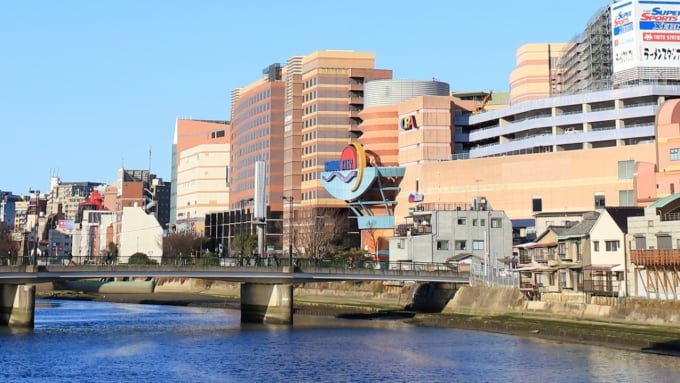
Next on our list of Hakata sightseeing spots is a location that’s a short walk from the station.
If you walk about 10 minutes west from Hakata Station (towards Nakasu), you’ll find Canal City Hakata, a uniquely designed building both inside and out. It was designed by American architect Jon Jerde. This stylish complex commercial facility includes a cinema complex (United Cinema), a theater for the Shiki Theatre Company, shopping malls, restaurants, and hotels (Grand Hyatt Fukuoka, Canal City Fukuoka Washington Hotel).
True to its name, there’s a canal (about 180 meters long) on the first basement level in the central area. The dynamic fountain show “Dancing Water,” which takes place around the canal, and various events are very popular! The nighttime light displays and seasonal illuminations are also attractive features.
In addition to regular character shops like Weekly Shonen Jump and Disney Store, you can also enjoy limited-time pop-up shops. At the ramen-themed park “Ramen Stadium 2,” Japan’s top ramen shops battle it out. Shops that don’t perform well get replaced a few times a year—truly a Ramen Stadium! With its thoughtfully designed architecture, events, and shops, Canal City Hakata is a fun space where not only tourists but also adults and children can enjoy themselves all day long.
Name: Canal City Hakata
Address: 1-2 Sumiyoshi, Hakata-ku, Fukuoka City, Fukuoka Prefecture
Official/Related Website URL: https://canalcity.co.jp/
3. Tōchō-ji Temple
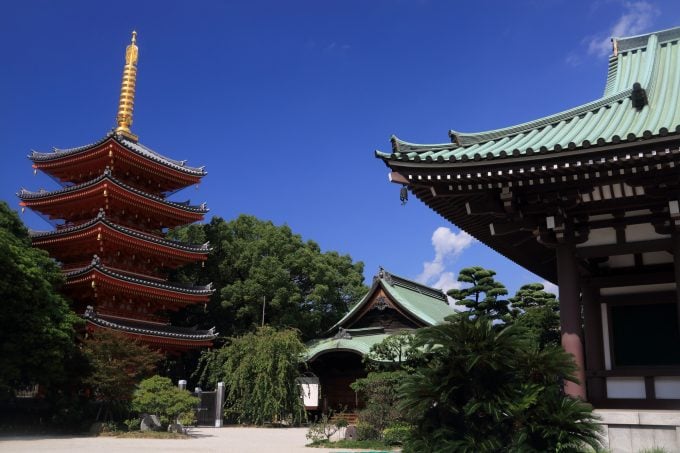
As a sightseeing spot near Hakata Station, we’ll introduce one famous shrine and one famous temple. First is Nangakusan Tōchō-ji, a special head temple of the Shingon sect, which was founded by the monk Kūkai and was the first esoteric temple in Japan. Tōchō-ji is the family temple of the Kuroda clan, lords of Fukuoka, and is one of Hakata's most iconic historical sightseeing spots.
The main highlight is the largest wooden seated statue in Japan, the Fukuoka Daibutsu. The seated Shakyamuni Buddha statue in the Daibutsu Hall is made of cypress and stands 108 meters tall. It’s surprising that, even though it’s wooden, it’s almost the same height as the Kamakura Daibutsu, which is around 113 meters tall. The height of 108 meters corresponds to the 108 human desires. The base of the Daibutsu features the “Hell and Paradise Experience,” where you can touch the “Ring of Buddha” in the dark passage, which is said to guide you to paradise. It may seem a bit scary, but it’s worth trying.
Also, don’t miss the Thousand-Armed Kannon Bodhisattva Statue, a designated Important Cultural Property of Japan, the five-storied pagoda made entirely of cypress, where Buddha’s relics brought back by Kūkai are stored, and the “Senjimon” calligraphy written by Kūkai, which once hung in Oda Nobunaga’s room at Honno-ji Temple. The large cherry blossom tree on the grounds is famous, making the temple a beloved cherry blossom viewing spot. Tōchō-ji is about a 10-minute walk from Hakata Station and is easily accessible from Gion Station on the Subway Airport Line.
Name: Tōchō-ji Temple
Address: 2-4 Gokusho-machi, Hakata-ku, Fukuoka City, Fukuoka Prefecture
Official/Related Website URL: http://bunkazai.city.fukuoka.lg.jp/cultural_properties/detail/57
4. Kushida Shrine
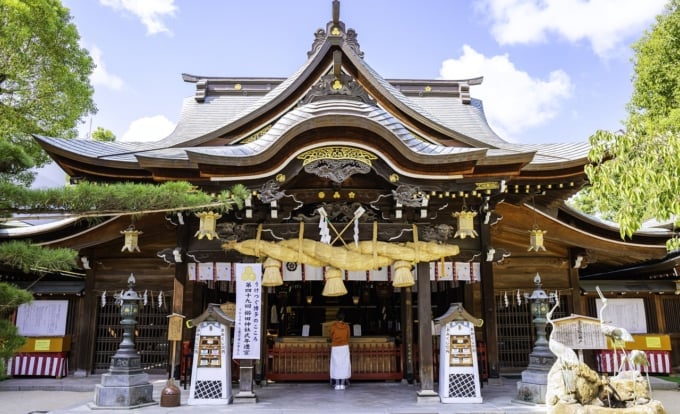
Known affectionately by the people of Hakata as “Okushida-san,” Kushida Shrine is located about 400 meters southwest of Tōchō-ji, on the east side of Nakasu. It is Hakata’s old guardian deity shrine, and the gods enshrined are Amaterasu Ōmikami, Ōhata Nushi no Mikoto, and Susanoo no Mikoto.
The Hakata Gion Yamakasa festival in July and the Hakata Okunchi festival in October are two of Hakata’s representative festivals, both held at Kushida Shrine. The Hakata Matsubayashi (Dontaku) in May also starts from Kushida Shrine.
Kushida Shrine’s Decoration Yamakasa
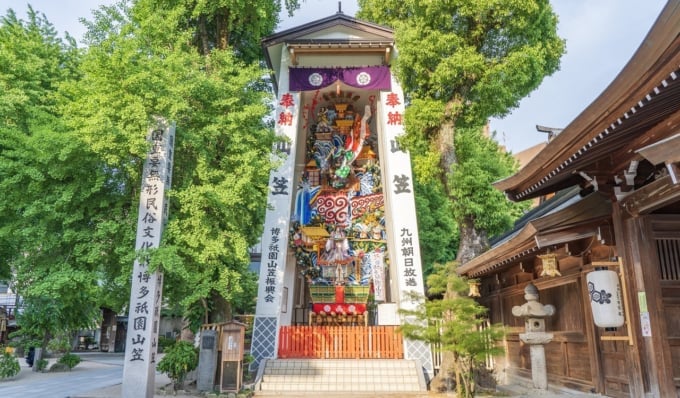
Tourist highlights include the Decoration Yamakasa on the shrine grounds, the sacred spring Reisen Tsuru no Ido, which is said to grant long life, and the Eto Ehōban, which hangs from the ceiling of the gate. Also, don’t miss the Kushida Gingko Tree, estimated to be around 1,000 years old, believed to be a sacred tree that grants long life.
Name: Kushida Shrine
Address: 1-41 Kamikawabata-machi, Hakata-ku, Fukuoka City, Fukuoka Prefecture
Official/Related Website URL: https://goo.gl/pbV0PC
5. Hakata Riverain
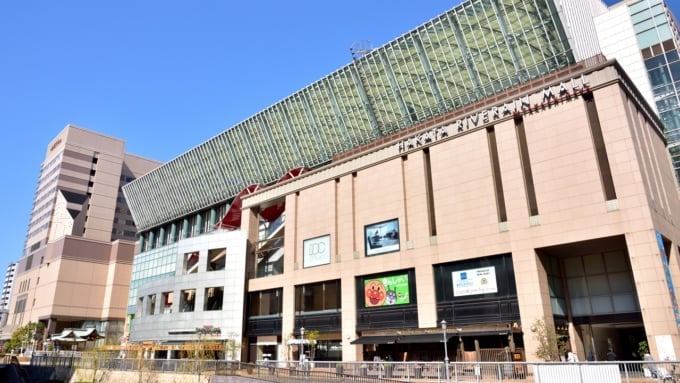
Adjacent to the north side of Nakasu Kawabata Station on the subway line, Hakata Riverain is a fusion of cultural and commercial facilities. It consists of three sophisticated buildings, with the central Riverain Center Building housing the Fukuoka Asian Art Museum, the Fukuoka Anpanman Children’s Museum in Mall, and the Hakata Riverain Mall.
The East Site Office Building includes Hakataza Theater and office floors. Additionally, the Hotel Okura Fukuoka is adjacent to the Riverain Center Building. After shopping or exploring, it’s also nice to take a leisurely stroll along the Hakata Yume Kaidō riverside promenade.
Name: Hakata Riverain
Address: 3-1 Shimokawabata-machi, Hakata-ku, Fukuoka City, Fukuoka Prefecture
Official/Related Website URL: http://riverain.co.jp/
Fukuoka Anpanman Children’s Museum in Mall
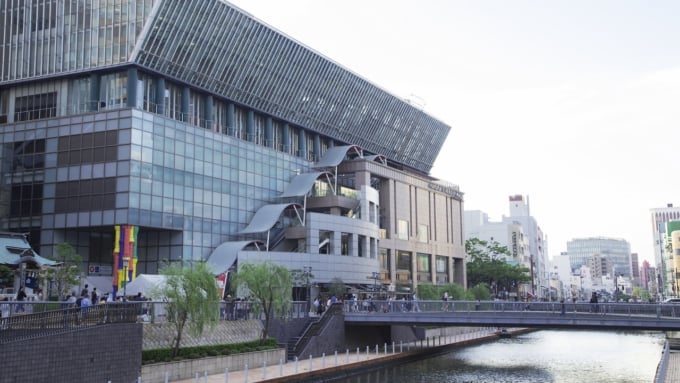
The fifth Anpanman Museum to be built in Japan, this is the only one in the Kyushu, Chugoku, and Shikoku regions. The open space with a glass roof and the all-weather atrium allow children to play to their hearts’ content, unaffected by heat or rain.
Children can interact with Anpanman and his friends, dance, take pictures, and enjoy limited-time events. The shops are also well-stocked with “Anpan,” the bread associated with Anpanman, and fun merchandise that will make you want to buy everything. Popular with both locals and tourists, the Anpanman Museum is located on the 5th and 6th floors of the Riverain Center Building.
Name: Fukuoka Anpanman Children’s Museum in Mall
Address: 5th and 6th floors, Riverain Center Building, 3-1 Shimokawabata-machi, Hakata-ku, Fukuoka City
Official/Related Website URL: http://www.fukuoka-anpanman.jp/
Fukuoka Asian Art Museum
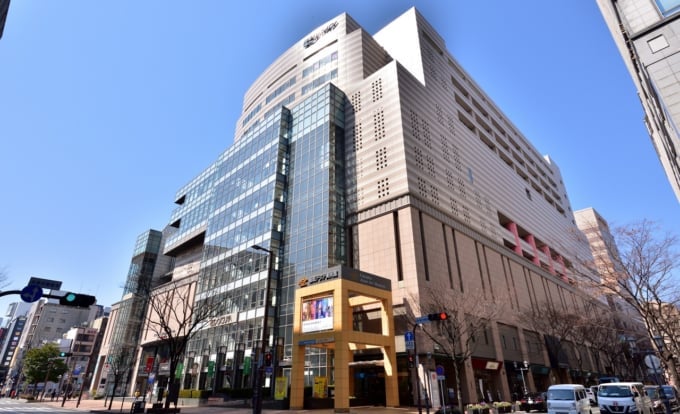
Located on the 7th and 8th floors of the Riverain Center Building, the Fukuoka Asian Art Museum houses around 2,700 pieces of Asian paintings, photographs, sculptures, and objects, focusing on modern and contemporary art.
Opened in 1999 as an initiative unique to Fukuoka, a city historically and geographically serving as a gateway for exchange with Asia. The museum also has a kids' space with picture books, and events such as picture books and kamishibai storytelling sessions. The admission fee is reasonable, making it an accessible museum where you can easily drop by as a part of your Hakata tour.
Name: Fukuoka Asian Art Museum
Address: 7th and 8th floors, Riverain Center Building, 3-1 Shimokawabata-machi, Hakata-ku, Fukuoka City
Official/Related Website URL: http://faam.city.fukuoka.lg.jp/home.html
6. Suijo Park “SHIP’S GARDEN”
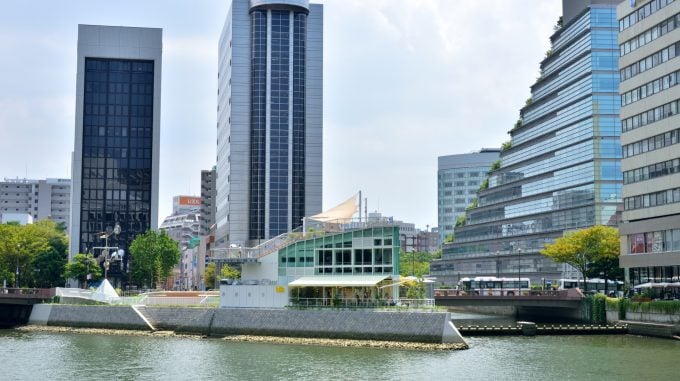
The waterside park at the northernmost tip of Nishinakasu was renovated, and in July 2016, SHIP’S GARDEN, a ship-designed facility, opened. The rooftop of the building is an open plaza with a great view, perfect for a relaxing break while enjoying the pleasant breeze.
SHIP’S GARDEN features restaurants such as the globally acclaimed bills Fukuoka, known for having the “world’s best breakfast,” and the Chinese restaurant Xingqi Cai NOODLE & CHINOIS.
Name: Suijo Park “SHIP’S GARDEN”
Address: 13 Nishinakasu, Chuo-ku, Fukuoka City, Fukuoka Prefecture
Official/Related Website URL: http://suijo-park.jp/
7. River Cruise (Hakata, Nakasu, Naka River Water Bus)
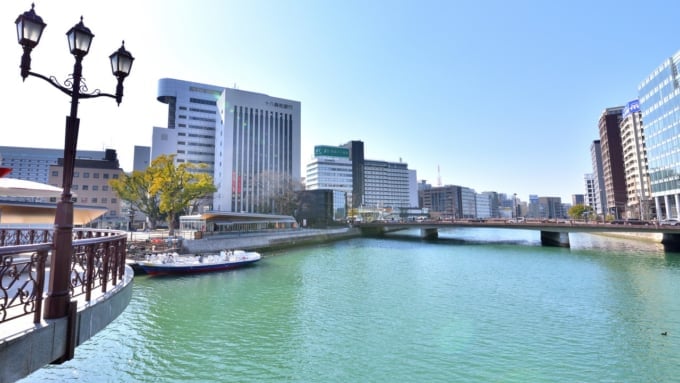
If you’re tired of walking, why not explore Hakata via a water bus departing from Fukuoka Deai Bridge, located near Suijo Park? Hakata is known for its many rivers, making a river cruise a great way to see the city’s scenery from a new perspective.
The recommended and affordable Nakagawa Sightseeing Course cruises along the Naka River from Canal City to Hakata Port. You’ll pass lively food stalls, the Hakata Port Tower, and other tourist spots. The water bus operates from 11 AM to 10 PM, allowing you to enjoy the night view from the boat as well. This compact 30-minute river cruise includes a performance on the boat stage.
Name: River Cruise (Hakata, Nakasu, Naka River Water Bus)
Address: 6 Nishinakasu, Chuo-ku, Fukuoka City, Fukuoka Prefecture
Official/Related Website URL: http://www.hana-tenjin.jp/
8. ACROS Fukuoka & Tenjin Central Park
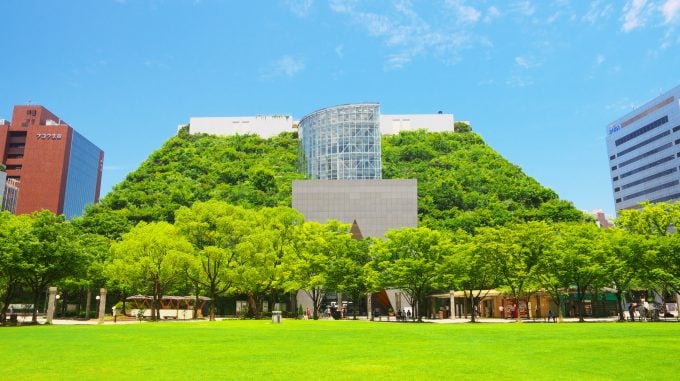
Named ACROS Fukuoka to represent Fukuoka as a crossroads with Asia, it opened on April 29, 1995, on the site of the former Fukuoka Prefectural Government building. Its unique design, inspired by a mountain, was created with the theme of harmony with nature and creating a space that enriches the heart. It won the BCS Award (Building Contractors Society Award).
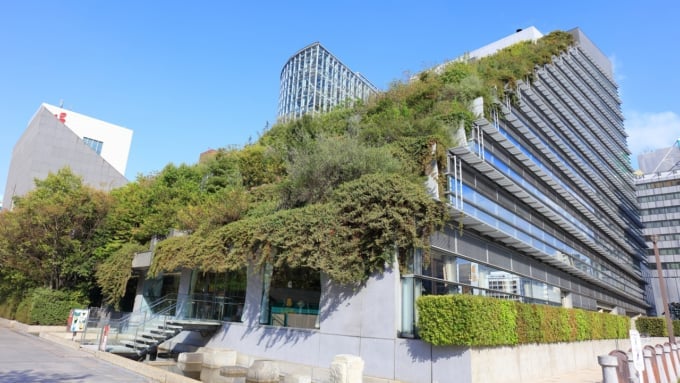
The Step Garden on the roof is lush with seasonal plants, and a waterfall flows from the 5th floor, making you forget that you’re on top of a building. The entrance to the Step Garden is located on the 2nd floor on the central park side. You can climb to the observation deck at the top, but access to the deck is only available on weekends and holidays.
Inside, the building is bright and open, with an atrium stretching from the 2nd basement level to the 12th floor. It houses the Fukuoka Symphony Hall, an international conference hall, the Fukuoka Passport Center, restaurants, and shops. To the south of ACROS Fukuoka is Tenjin Central Park, featuring a large lawn, cherry blossoms, fountains, and benches. It’s a relaxing sightseeing spot where you can unwind, combining ACROS Fukuoka with the park.
Name: ACROS Fukuoka & Tenjin Central Park
Address: 1-1-1 Tenjin, Chuo-ku, Fukuoka City, Fukuoka Prefecture
Official/Related Website URL: http://www.acros.or.jp/
9. Bayside Place Hakata
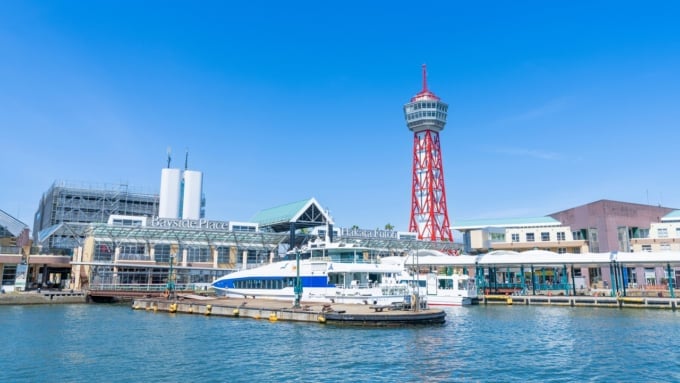
Located at Hakata Port, Bayside Place Hakata is a complex commercial facility that includes the Hakata Pier Passenger Terminal. It’s a popular waterfront spot for families and tourists, featuring an aquarium, hot springs, a bay market, restaurants, and more, including the Hakata Port Tower mentioned below. The cylindrical aquarium, where you can watch sea turtles and fish swim, is about 8 meters tall and 9 meters in diameter. The bay market offers Hakata seafood, vegetables, and souvenirs from Fukuoka and Hakata.
On Sundays and public holidays, a road train connects Bayside Place Hakata and the Fukuoka International Terminal, offering scenic views of the sea while enjoying the pleasant ocean breeze. It’s a relaxing way to travel and sightsee, and the best part is that the ride is free!
Name: Bayside Place Hakata
Address: 13-6 Chikkohonmachi, Hakata-ku, Fukuoka City, Fukuoka Prefecture
Official/Related Website URL: http://www.baysideplace.jp/
◆Hakata Port Tower
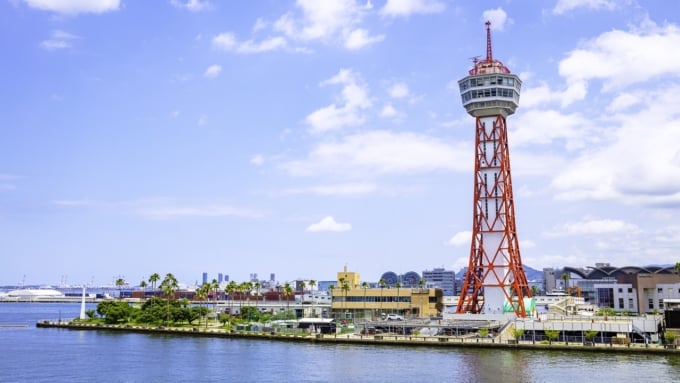
Hakata Port Tower, the symbol of Hakata Pier, was completed in 1964. The tower was designed by the late Tachu Naito, also known as the "Tower Doctor," who also designed Tokyo Tower. From the 70-meter-high observation deck, you can enjoy a 360-degree view of Fukuoka City and Hakata Bay. On the first floor is the Hakata Port Bayside Museum, which introduces the role of the port and information about Hakata Port.
Both Hakata Port Tower and the Hakata Port Bayside Museum have free admission! The tower is open until 10 PM, so you can also enjoy the night view. The tower and Bayside Place illuminated at night are popular sightseeing spots for couples.
Name: Hakata Port Tower
Address: 14-1 Chikkohonmachi, Hakata-ku, Fukuoka City, Fukuoka Prefecture
Official/Related Website URL: http://port-of-hakata.city.fukuoka.lg.jp/healing_leisure/porttower.html
Minato Onsen/Namiha no Yu
Located in Bayside Place Hakata, Minato Onsen Namiha no Yu is a natural hot spring that springs from 800 meters underground, rich in calcium and sodium chloride. This natural hot spring has abundant water and thick mineral content, offering outdoor baths, stone saunas, restaurants, esthetic services, and massages—perfect for relieving fatigue from sightseeing. It's one of the best hot springs facilities located close to the city center of Hakata.
Name: Minato Onsen Namiha no Yu
Address: 13-1 Chikkohonmachi, Hakata-ku, Fukuoka City
Official/Related Website URL: http://www.baysideplace.jp/entertainment/#namiha
10. Ōhori Park
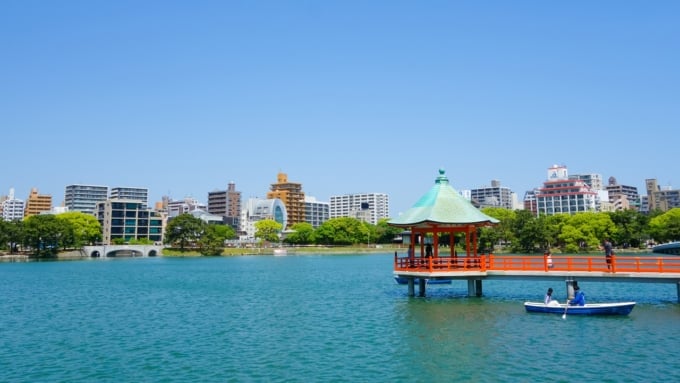
Take the subway two stations west from Tenjin Station, and get off at Ōhori Park Station. On the south side of the station, you'll find Ōhori Park, which uses the outer moat of Fukuoka Castle, and Maizuru Park, where the ruins of Fukuoka Castle are located.
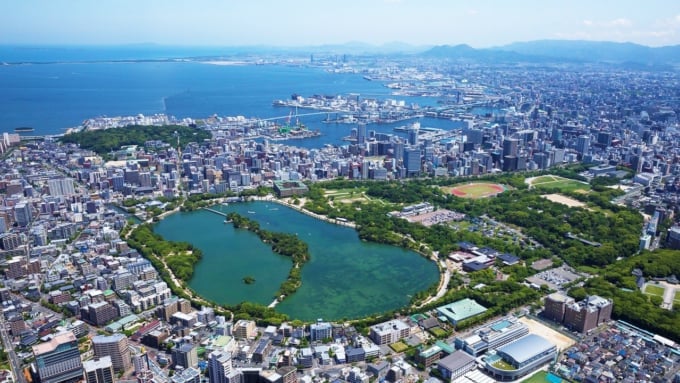
Ōhori Park is an urban park that served as the venue for the Fukuoka Expo in 1975. In the middle of the large pond, you'll find Yanagishima, Matsushima, and Ayame Island, connected by four bridges. The floating pavilion on Yanagishima is painted in beautiful red and is a popular photo spot for tourists. The path around the pond is about 2 kilometers long, perfect for jogging or strolling. Nearby, you'll find the Fukuoka Art Museum, a Japanese garden, a wild bird forest, a children's park, and a Noh theater.
The park is equipped with parking, so it's also convenient for visitors traveling by car or rental car. To the east of the park lies the Fukuoka Castle Ruins (Maizuru Park).
Name: Ōhori Park
Address: 1-2 Ōhori Park, Chuo-ku, Fukuoka City, Fukuoka Prefecture
Official/Related Website URL: http://www.ohorikouen.jp/
11. Fukuoka Castle Ruins
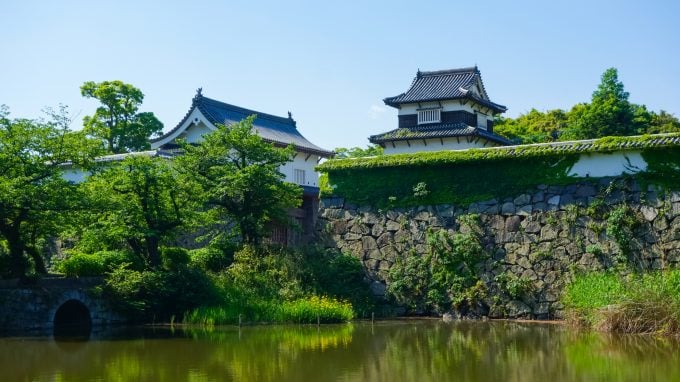
Also known as Maizuru Castle, Fukuoka Castle was built by Yoshitaka Kuroda (commonly known as Kuroda Kanbei) and his son Nagamasa, the rulers of the Fukuoka Domain.
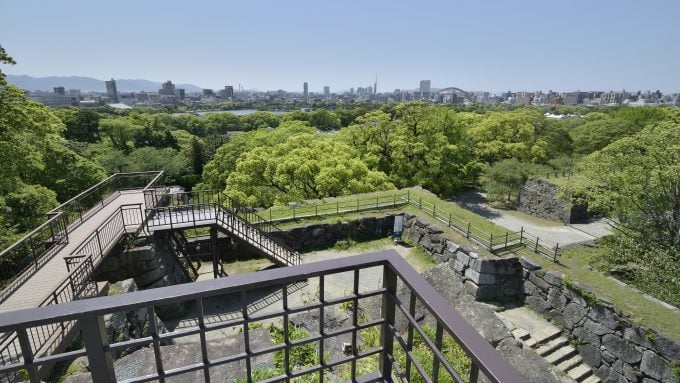
Remnants of the castle, such as turrets, gates, stone walls, and moats, can still be seen. The Ninomaru North Corner Turret and Otemon Gate have been reconstructed.
The Daitenshudai (main tower foundation) now serves as an observation deck, offering a view of the city. Most of the Fukuoka Castle Ruins are part of Maizuru Park, while the outer moat area is integrated into Ōhori Park.
Name: Fukuoka Castle Ruins
Address: Jonai, Chuo-ku, Fukuoka City, Fukuoka Prefecture
Official/Related Website URL: https://kojodan.jp/castle/92/
12. Fukuoka City Seaside Park “Umippi Beach”
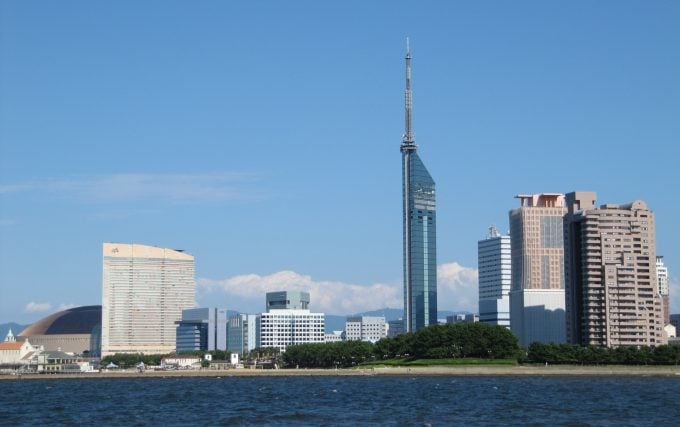
Walk about 5 minutes from Ōhori Park toward the sea, and you'll find the 36-story Hilton Fukuoka Seahawk adjacent to Fukuoka Yafuoku! Dome. The entire waterfront development area west of here (on the right side of the photo) is known as Fukuoka City Seaside Park “Umippi Beach”. Umippi Beach consists of the Jigyohama District and the Momochihama District of Seaside Momochi Beach Park, along with Marina Town Seaside Park.
The main tourist attractions in each district are the Fukuoka Yafuoku! Dome in the Jigyohama District, and the Fukuoka Tower and Marizon in the Momochihama District. The seaside park is well-developed with walkways and gazebos, and the Nagisa Bridge connects the Jigyohama and Momochihama districts.
Name: Fukuoka City Seaside Park “Umippi Beach” (Seaside Momochi & Marina Town Seaside Park)
Address: Momochihama, Sawara-ku to Jigyohama, Chuo-ku, Fukuoka City
Official/Related Website URL: http://www.marizon-kankyo.jp/
◆Fukuoka PayPay Dome
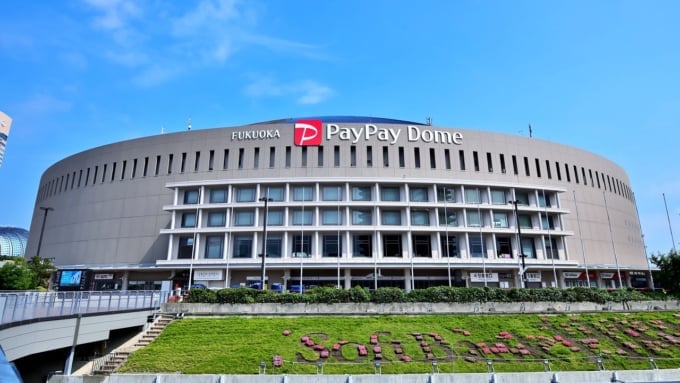
A multipurpose dome stadium with a retractable roof, used for baseball, live concerts, exhibitions, and other events. It is the second dome stadium built in Japan and the largest in the country. In February 2020, its name was changed from "Yafuoku! Dome" to "Fukuoka PayPay Dome."
A recommended activity is the "Dome Tour," where you can explore the behind-the-scenes areas of the dome. With a guide's explanations, you can visit the stands, the artificial turf field, the press conference room, the dugout where the managers and players sit, and the players' locker room, while taking photos. It’s an exciting experience that you rarely get to try. You can sign up for the tour at the Oh Sadaharu Baseball Museum located at Gate 7.
Name: Fukuoka PayPay Dome
Address: 2-2-2 Jigyohama, Chuo-ku, Fukuoka City, Fukuoka Prefecture
Official/Related Website URL: https://www.softbankhawks.co.jp/stadium/
◆Fukuoka Tower
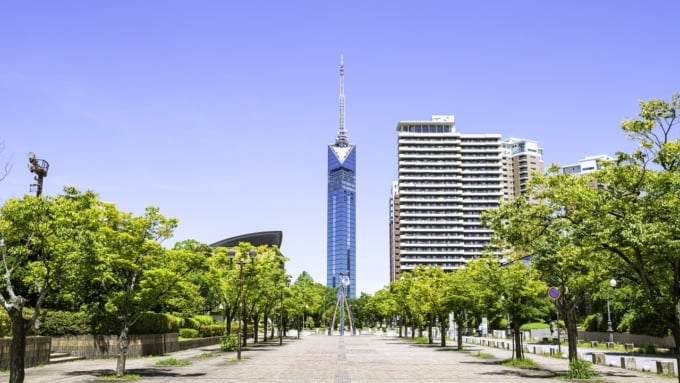
Fukuoka Tower is a sharp, equilateral triangular radio tower covered with half-mirrors, and it is a landmark of the Momochihama district. The tower stands 234 meters tall, and the observation deck on the 5th floor is 123 meters above ground. From the observation deck, you can enjoy a panoramic view of Fukuoka PayPay Dome, Hilton Fukuoka Seahawk, Marizon, and the cityscape. The night view from the observation deck of Fukuoka Tower has been selected as one of the "Top 100 Night Views."
Fukuoka Tower features various illuminations for different seasons and events, but if you spot a large heart-shaped illumination, consider yourself lucky! The observation deck of Fukuoka Tower is the first place in Fukuoka to be recognized as a "Lovers' Sanctuary." The heart-shaped illumination, called "Love Illumination," is often used for romantic surprises such as proposals or declarations of love. During Christmas, the tower and the surrounding trees are beautifully illuminated, creating a magical scene that is popular among couples and tourists.
Name: Fukuoka Tower
Address: 2-3-26 Momochihama, Sawara-ku, Fukuoka City, Fukuoka Prefecture
Official/Related Website URL: https://www.fukuokatower.co.jp/
◆ Marizon
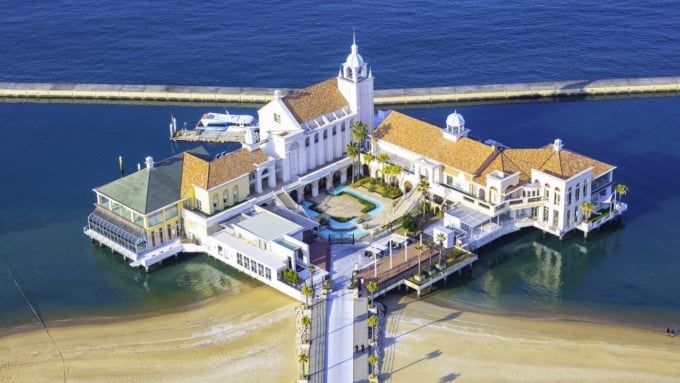
When you look out to sea from Fukuoka Tower, you’ll see a small island called Marizon. This waterfront island exudes a resort atmosphere and has won the Asian Urban Landscape Award and was chosen as the top spot in the “Fukuoka Treasures to Pass on to the 21st Century.”
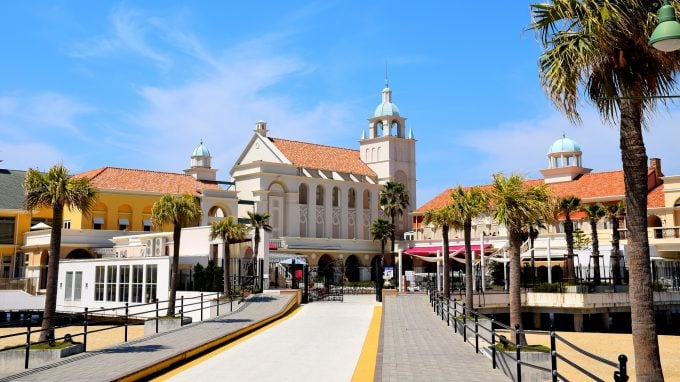
Marizon is a multi-purpose facility that includes a wedding venue, a creative Italian restaurant, a bar, a BBQ café, a marine sports shop, and an event hall. The charming buildings and scenic views make it a popular tourist spot, where you can’t help but feel excited!
The entrance to Marizon is the Central Plaza, the main gate from Fukuoka Tower. The plaza features various fountains, including spherical and pyramid-shaped water fountains, making it a fun sightseeing spot. In the summer, the beach in the Momochihama district, where Marizon is located, is bustling with tourists enjoying swimming and marine sports.
Name: Marizon
Address: 902-1 Momochihama, Sawara-ku, Fukuoka City
Official/Related Website URL: https://marizon.co.jp/
13. Fukuoka City Museum
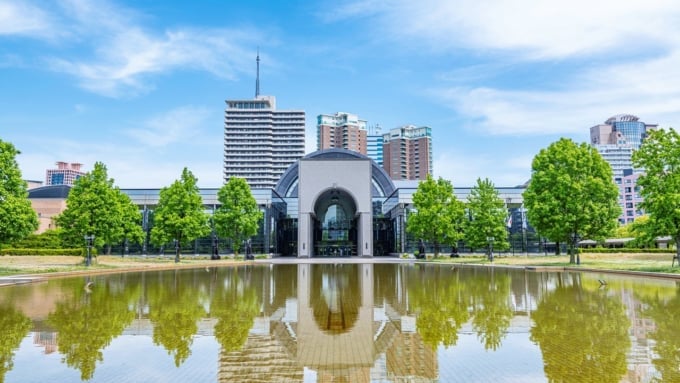
Next, let’s head to the southern side of the Momochihama district in Seaside Momochi. South of Fukuoka Tower is the Fukuoka City Museum, and to the west of it is the famous sightseeing spot, "Street of World Architects."
The most notable artifact at Fukuoka City Museum is the famous Gold Seal of King Na of Wa. The kingdom of "Na" is believed to have existed along the coast of what is now Hakata Bay in Fukuoka, and the gold seal was discovered on Shikanoshima Island, about 9 km north of the museum. Additionally, there are many cultural properties related to the Kuroda clan, the former lords of the Fukuoka Domain, such as the Nihongo, one of the "Three Great Spears of Japan," mentioned in the folk song "Kuroda-bushi."
Name: Fukuoka City Museum
Address: 3-1-1 Momochihama, Sawara-ku, Fukuoka City
Official/Related Website URL: http://museum.city.fukuoka.jp/
14. Street of World Architects
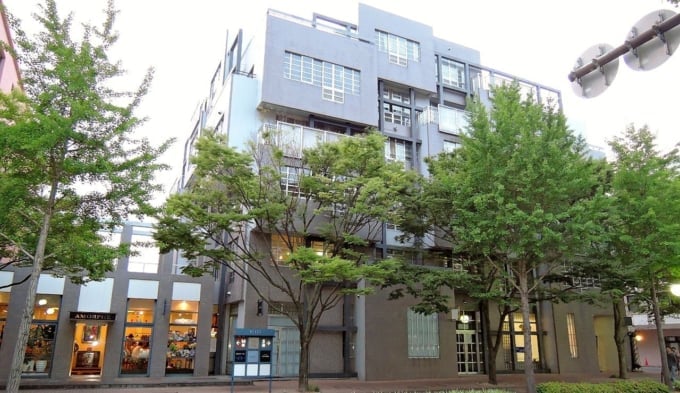
Just one block west of Fukuoka City Museum, you’ll find the Street of World Architects, where buildings designed by world-renowned architects are lined up. The street was produced by Arata Isozaki and includes works from famous architects such as Kisho Kurokawa, Hiroshi Igawa, Yasushi Kijima, Shoyo Yo, Junji Mikawa, Michael Graves, and Stanley Tigerman. This sophisticated area with its unique designs is a must-see, and the Fukuoka Open Top Bus also tours this area.
In Tenjin, you can see the Fukuoka Bank Headquarters, designed by Kisho Kurokawa, and in front of Hakata Station, you can find the Nishi-Nippon City Bank Headquarters, designed by Arata Isozaki. Many buildings in Hakata were designed by Japan’s leading architects, so be sure to check them out if you’re in the area!
Name: Street of World Architects
Address: Momochihama, Sawara-ku, Fukuoka City
Official/Related Website URL: https://yokanavi.com/spot/27025/
15. Fukuoka Open Top Bus (FUKUOKA OPEN TOP BUS)
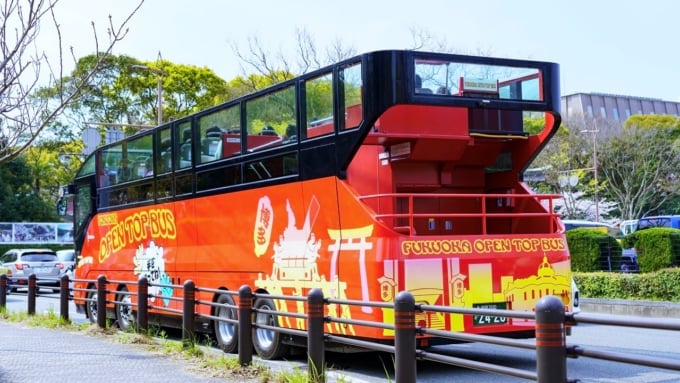
In contrast to the low-angle view you get from a river cruise, why not enjoy a tour of the Hakata cityscape from the high vantage point of an open-top, double-decker bus?
There are various courses available, including a route through the central area of Hakata, a course exploring the western side such as Seaside Momochi, and a night view course. The routes may change depending on the season, so for more details or to make reservations, contact Nishitetsu (Nishi-Nippon Railroad). The open-top bus ticket can be used as a Fukuoka City One-Day Free Pass, so take advantage of it for an exciting Hakata sightseeing experience.
Name: Fukuoka Open Top Bus (FUKUOKA OPEN TOP BUS)
Ticket Counter Address: 1st floor of Fukuoka City Hall, Tenjin, Chuo-ku, Fukuoka City (near Tenjin Central Park)
Official/Related Website URL: https://fukuokaopentopbus.jp/
16. Hakata Food and Culture Museum (HAKUHAKU)
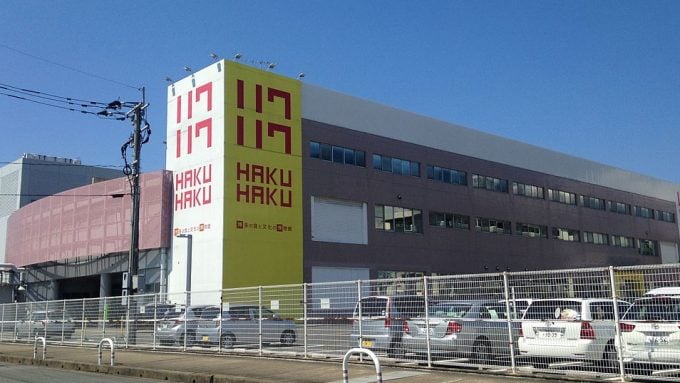
HAKUHAKU is a museum dedicated to the food culture of Fukuoka and Hakata, opened by Fukuya, a long-established maker of Hakata Mentaiko (spicy cod roe). The museum is divided into five zones: a museum, factory tour, hands-on workshop, café, and shop.
You can learn about the origins of Mentaiko from a guide, observe how Mentaiko is made in the factory, and even compare different scents. The hands-on workshop allows you to create your own Mentaiko by adjusting the amount of chili to suit your taste. You can also take a taste test and compare the flavors of different Mentaiko. At the café, you can enjoy original Mentaiko dishes like "Mentaiko Grilled Mochi" and "Tori Karaage with Mentaiko Flavor."
HAKUHAKU is located about 3 km north of Hakata Station, and it’s about a 20-minute walk from the nearest station, JR Yoshizuka Station. There is a large parking lot, making it convenient for those traveling by car or rental vehicle.
Name: Hakata Food and Culture Museum (HAKUHAKU)
Address: 2-14-28 Sharyo, Higashi-ku, Fukuoka City
Official/Related Website URL: http://117hakuhaku.com/
17. Nokonoshima Island Park
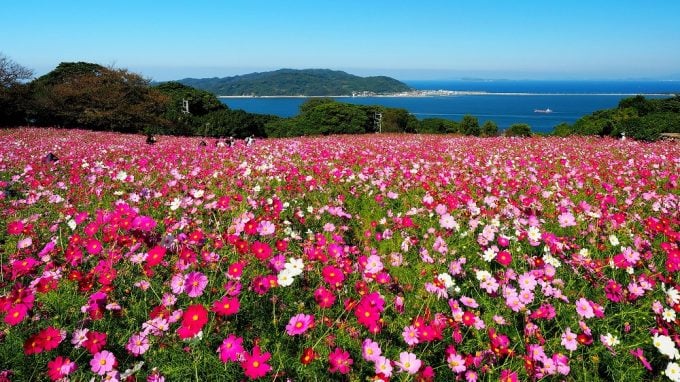
Nokonoshima is a resort island floating in Hakata Bay, just a 10-minute ferry ride from Meinohama Ferry Terminal, located on the western side of Seaside Momochi and Marina Town Seaside Park. The ferry fare is quite affordable, making it a popular nature spot for locals.
The highly recommended Nokonoshima Island Park is located in the northern part of Nokonoshima. In spring, the park is covered in nanohana (canola flowers), and in autumn, it transforms into a sea of cosmos flowers. Visitors can enjoy seasonal blooms like cherry blossoms and sunflowers throughout the year, making it a peaceful retreat for tourists. You can also try pottery or painting workshops, and interact with rabbits and goats at the mini zoo. There are also mini rope skiers and athletic facilities, so children can enjoy a full day of fun.
Name: Nokonoshima Island Park
Address: 1624 Noko, Nishi-ku, Fukuoka City
Official/Related Website URL: http://nokonoshima.com/
◎Summary
We hope you enjoyed our photo and text tour of Hakata, the largest city in Kyushu and a key transportation hub in Fukuoka Prefecture. When you think of Hakata, you may think of gourmet food, but there are surprisingly many tourist spots in the city. The city has a well-developed transportation system, so you can get around on foot while using the subway and buses. Hakata is easily accessible by plane and bullet train, so enjoy eating, sightseeing, playing, and making the most of it!
RELATED ARTICLES
REGIONS
CATEGORIES
FEATURED ON Japan
-
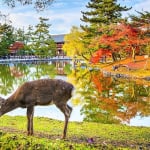
Must-Visit Tourist Spot in Nara! Highlights of Tōdai-ji Temple
-
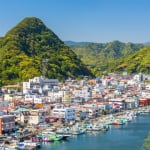
7 recommended sightseeing spots to visit in Shimoda, the ‘Land of Opening the Country’!
-
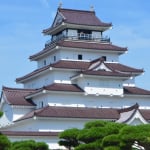
Tour Aizuwakamatsu Castle (Tsuruga Castle)! Introducing the history and highlights of this fierce Boshin War battlefield
-

6 tourist spots in Shizuoka you can enjoy even on rainy days – Indoors with animals and music
-

Irresistible Souvenirs! 6 Must-Buy Items When Visiting Tomakomai
MOST POPULAR ON Japan
-
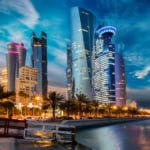 1
1Doha: Must-see Attractions in the Capital of Qatar
-
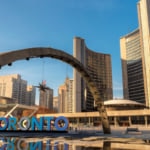 2
2Toronto: 10 Things to do in this Picturesque Canadian City
-
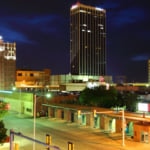 3
3Amarillo: A City Famous for It’s Amazing Canyons, Great History and Music
-
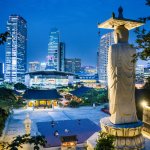 4
4South Korea: Dazzling Scenery, Rich Culture and Fascinating History
-
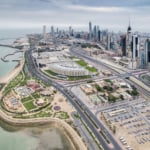 5
5Kuwait: A Country in Middle East Asia Famous for Hot Sand Dunes and Stunning Cityscape


